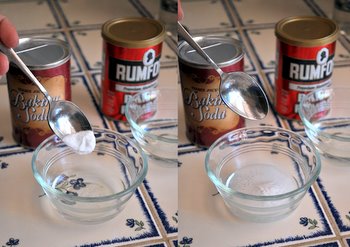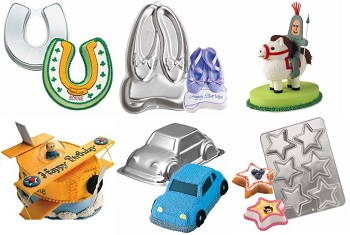
Baking powder and baking soda are pantry ingredients that don’t always have a high turnover. If you bake irregularly, chances are good that you’ll have that box of baking soda on the shelf for a very long time. Even if you bake regularly, it takes a while for a container of baking powder to get used up – not to mention that it is easy to lose a partially used container in the back of a crowded pantry.
Chemical leaveners, like baking powder and baking soda, can lose their potency over time. This is especially true when they are not stored in airtight containers. Impotent baking powder or baking soda can be the cause the cause of flat cakes, dense cookies and baked goods that simply don’t rise as much as they should. Fortunately, there is a very simple test that you can do to see if that nearly-forgotten box of baking soda is still good enough to bake with. In fact, try this test with fresh baking powder and baking soda so you’ll know what to look for in the future:
- To test baking soda: Put a few tablespoons of white vinegar into a small bowl and add a teaspoon of baking soda. It should bubble up furiously, and the foaming should take several moments to subside. The more bubbles, the more potent the baking soda. If there is no reaction, or you only end up with a handful of small bubbles, you need to replace you baking soda.
- To test baking powder: Put a few tablespoons of warm water (warm tap water is fine, but cold water is not) into a small bowl and add a teaspoon of baking powder. The mixture should make a fizzing noise and, after a moment, the baking powder will begin to fizz and the water will become very cloudy with tiny bubbles. The more bubbles, the fresher the baking powder. Baking powder reacts with liquids and heat, but does not react as well with cold water (even fresh powder won’t fizz much in ice water), so do not use it for this test.





little daisy
March 15, 2011Good tips! I have no idea that we can test the freshness of these chemical leaveners. No wonder when I bake sometimes, the cookies don’t rise so much.
Joyce
March 15, 2011This is interesting ! I learnt something new today. Thanks for sharing !
Sherry
March 16, 2011Seriously, this is probably one of the best tips you can provide!
These two baking ingredients are so often forgotten about in my home, and then my daughter and I, who both love to bake but often lack the time, ask each other ‘how old is the baking powder’…we never know and can’t tell how…until now.
Kiersten
March 19, 2011THANK YOU for this! I’ve had a few occasions where my baking powder expired and I didn’t realize it. Not only did my baked goods not rise, but they tasted like aluminum.
debbie
March 20, 2011thank you nicole! i used your test recently as i noticed my baked goodies were not rising the way they should. 🙂
Amy
March 21, 2011I can’t even tell you how old my baking soda is. Gonna have to try this when I get home. Thankfully, we just opened a new baking powder a few weeks ago. Great tips!
lila
December 6, 2011Thank you so much! 🙂
Dot Davis
December 31, 2012Thanks for the method to test baking powder! I have a can that says 2009, but it pactically bubbled out of the little bowl when I tested it. You saved me a 36-mile country round trip to the grocery store. I ‘m using it! Obviously, I don’t bake much!! 🙂 Thanks again!! Happy New Year.